童年游戏的英文表达
- 格式:ppt
- 大小:8.55 MB
- 文档页数:22
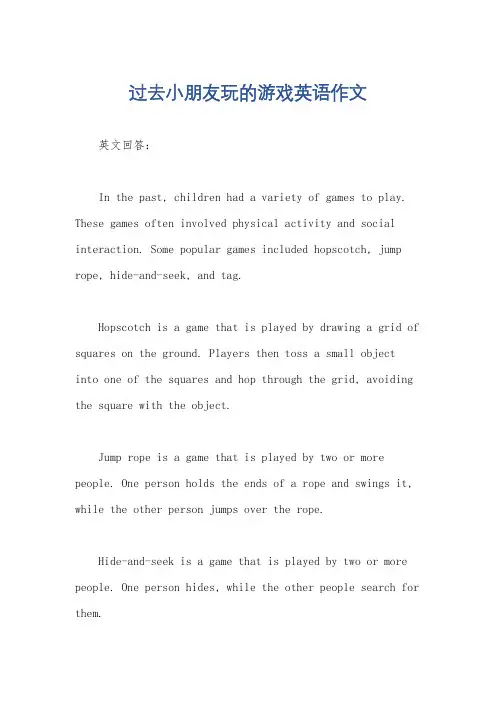
过去小朋友玩的游戏英语作文英文回答:In the past, children had a variety of games to play. These games often involved physical activity and social interaction. Some popular games included hopscotch, jump rope, hide-and-seek, and tag.Hopscotch is a game that is played by drawing a grid of squares on the ground. Players then toss a small objectinto one of the squares and hop through the grid, avoiding the square with the object.Jump rope is a game that is played by two or more people. One person holds the ends of a rope and swings it, while the other person jumps over the rope.Hide-and-seek is a game that is played by two or more people. One person hides, while the other people search for them.Tag is a game that is played by two or more people. One person chases the other people, and if they catch someone, that person becomes the new chaser.These are just a few of the many games that children used to play. These games were a great way for children to get exercise, socialize, and have fun.中文回答:过去,孩子们玩的游戏多种多样。
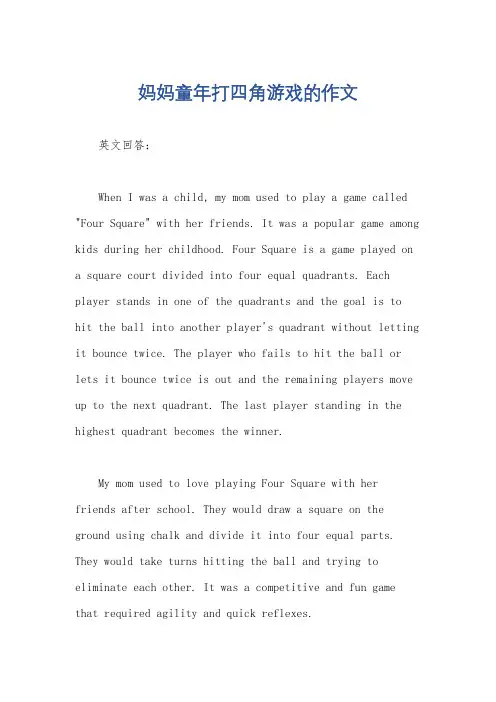
妈妈童年打四角游戏的作文英文回答:When I was a child, my mom used to play a game called "Four Square" with her friends. It was a popular game among kids during her childhood. Four Square is a game played on a square court divided into four equal quadrants. Each player stands in one of the quadrants and the goal is tohit the ball into another player's quadrant without letting it bounce twice. The player who fails to hit the ball or lets it bounce twice is out and the remaining players move up to the next quadrant. The last player standing in the highest quadrant becomes the winner.My mom used to love playing Four Square with herfriends after school. They would draw a square on the ground using chalk and divide it into four equal parts. They would take turns hitting the ball and trying to eliminate each other. It was a competitive and fun gamethat required agility and quick reflexes.中文回答:小时候,妈妈经常和朋友们一起玩一个叫做“四角”的游戏。
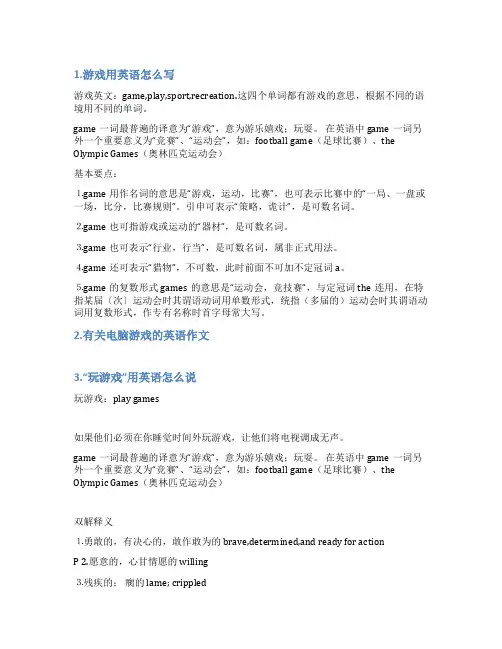
1.游戏用英语怎么写游戏英文:game,play,sport,recreation.这四个单词都有游戏的意思,根据不同的语境用不同的单词。
game一词最普遍的译意为“游戏”,意为游乐嬉戏;玩耍。
在英语中game一词另外一个重要意义为“竞赛”、“运动会”,如:football game(足球比赛)、the Olympic Games(奥林匹克运动会)基本要点:⒈game用作名词的意思是“游戏,运动,比赛”,也可表示比赛中的“一局、一盘或一场,比分,比赛规则”。
引申可表示“策略,诡计”,是可数名词。
⒉game也可指游戏或运动的“器材”,是可数名词。
⒊game也可表示“行业,行当”,是可数名词,属非正式用法。
⒋game还可表示“猎物”,不可数,此时前面不可加不定冠词a。
⒌game的复数形式games的意思是“运动会,竞技赛”,与定冠词the连用,在特指某届〔次〕运动会时其谓语动词用单数形式,统指(多届的)运动会时其谓语动词用复数形式,作专有名称时首字母常大写。
2.有关电脑游戏的英语作文3.“玩游戏”用英语怎么说玩游戏:play games如果他们必须在你睡觉时间外玩游戏,让他们将电视调成无声。
game一词最普遍的译意为“游戏”,意为游乐嬉戏;玩耍。
在英语中game一词另外一个重要意义为“竞赛”、“运动会”,如:football game(足球比赛)、the Olympic Games(奥林匹克运动会)双解释义⒈勇敢的,有决心的,敢作敢为的 brave,determined,and ready for actionP 2.愿意的,心甘情愿的 willing⒊残疾的;瘸的 lame; crippled基本要点⒈game作“勇敢的,有决心的,敢作敢为的”解时在句中可用作定语或表语。
⒉game也可作“愿意的,心甘情愿的”解,在句中多用作表语,与介词for连用。
⒊在口语中, game还可作“残疾的;瘸的”解,属古旧用法。
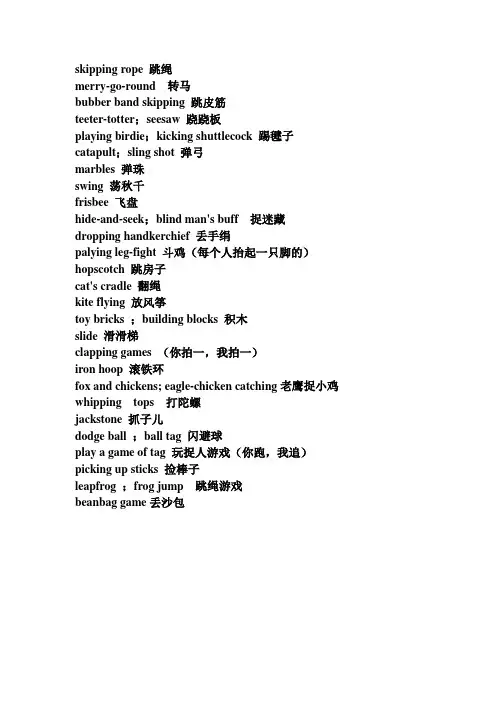
skipping rope 跳绳merry-go-round 转马bubber band skipping 跳皮筋teeter-totter;seesaw 跷跷板playing birdie;kicking shuttlecock 踢毽子catapult;sling shot 弹弓marbles 弹珠swing 荡秋千frisbee 飞盘hide-and-seek;blind man's buff 捉迷藏dropping handkerchief 丢手绢palying leg-fight 斗鸡(每个人抬起一只脚的)hopscotch 跳房子cat's cradle 翻绳kite flying 放风筝toy bricks ;building blocks 积木slide 滑滑梯clapping games (你拍一,我拍一)iron hoop 滚铁环fox and chickens; eagle-chicken catching老鹰捉小鸡whipping tops 打陀螺jackstone 抓子儿dodge ball ;ball tag 闪避球play a game of tag 玩捉人游戏(你跑,我追)picking up sticks 捡棒子leapfrog ;frog jump 跳绳游戏beanbag game丢沙包Hide-and-seek or hide-and-go-seek (or, in Scotland, hidey) is a variant of the game tag, in which a number of players conceal themselves in the environment, to be found by one or more "seekers". Numerous variants of the game can be found worldwide.[edit] GameplayThe game starts with all players in a central location, indoors or out. One player is given the designation of "it". There are two portions to the game: the hiding, where all the players except "it" locate a place in which to hide, and the seeking, where "it" attempts to locate as many of the players as possible. The overall objective is to remain undiscovered by "it".The hiding portion of the game begins with "it" using a method to avoid seeing the other players hiding, and counting out loud for a predetermined number of seconds, often with the aid of a word that takes about one second to say (e.g., "one-Mississippi, two-Mississippi..."). During the count, other players locate a place to hide. When the counting is completed, the "it" player usuallyannounces the start of the seeking portion by shouting a phrase such as "Ready or not, here I come!". "It" then begins a search for the hiding players.When all players have been found or caught, the next game's "it" is usually the first player to be found. Alternatively, the players can agree that the last person to be discovered or tagged will become the next "it".Occasionally, the "it" may call out "Ollie Ollie Oxen Free" to say that he has given up, and the players leave their hiding places. [edit] V ariantsIn some variations players may move to other hiding spots while "it" isn't looking, and those who can remain hidden the longest are considered to be the best players.In a more active variant, hide and seek can be combined with the game of tag. Instead of "it" simply spotting players, he or she has to tag them instead to get them out. Hiders can make a dash for 'Home Base', which is usually a landmark next to where whoever is "it" counts off. Touching the base area makes a hider safe, and the aim of the game is to touch base without being tagged; this game was, and may still be known as Pom Pom Home by school children in Berkshire (UK), which may be a variant of Pom Pom Runaway, as outlined below.Another form similar to the above game involves tagged players becoming another "it". Rather than having a base, the aim is simply to survive as long as possible without being tagged, and the last one to not be tagged is the winner.A derivative game is called Sardines. In this variant, only one person hides and the others must then find the person that's hiding and hide with them. The last person to find the group that's hiding is the loser. If playing indoors, turning the lights off may make it easier to hide large groups of people. A. M. Burrage calls this version of the game 'Smee' in his 1931 ghost story of the same name.[1]Another name to call it is Y aki 123, where there is a home base in which the person who is it guards but has to also look for the players, the hiders try and make their way to the home base either undetected or if seen by the person who is it must get to homebase before them and call out Y aki 123. The hiders who are victorious have to stay near homebase til the end of the game, but they can also help the other hiders by distracting the person who it is.。
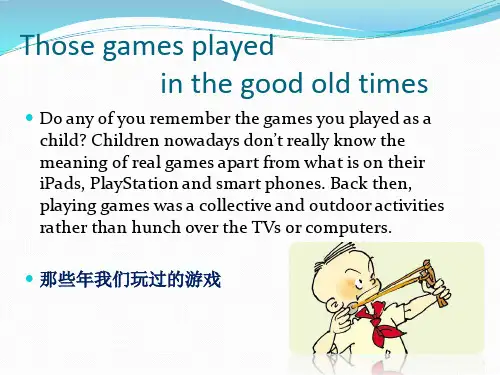
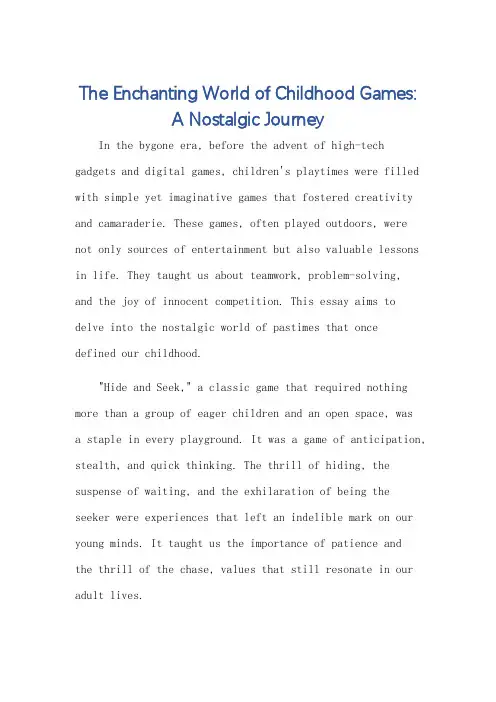
The Enchanting World of Childhood Games:A Nostalgic JourneyIn the bygone era, before the advent of high-tech gadgets and digital games, children's playtimes were filled with simple yet imaginative games that fostered creativity and camaraderie. These games, often played outdoors, were not only sources of entertainment but also valuable lessons in life. They taught us about teamwork, problem-solving,and the joy of innocent competition. This essay aims to delve into the nostalgic world of pastimes that oncedefined our childhood."Hide and Seek," a classic game that required nothing more than a group of eager children and an open space, wasa staple in every playground. It was a game of anticipation, stealth, and quick thinking. The thrill of hiding, the suspense of waiting, and the exhilaration of being the seeker were experiences that left an indelible mark on our young minds. It taught us the importance of patience andthe thrill of the chase, values that still resonate in our adult lives.Another timeless game was "跳房子" (Hopscotch), knownas 'Hopscotch' in English. Drawn on the ground with chalk, this game involved hopping from one square to another,often tossing a small stone or pebble into each square. It was a game that tested balance, agility, and strategic planning. Moreover, it was a social activity that brought children together, fostering friendships and promoting physical fitness."Tag," or "你追我赶" in Chinese, was another favorite pastime. It was a simple game of chase where the 'it' would try to touch someone, making them the new 'it.' It was a game of speed, agility, and quick reflexes. More importantly, it instilled a sense of fair play and sportsmanship, as we learned to accept defeat gracefullyand to respect the rules."Red Light, Green Light" or "红绿灯" in Chinese, was a game that taught us self-control and observation. Theplayer who acted as the traffic light would call out commands, and everyone else had to stop or move accordingly. This game not only entertained but also taught us about obedience and the importance of following instructions.Not all games were physically demanding. "Chinese Whispers" or "传话游戏" was a game of whispers and misinterpretations. Sitting in a line, children would whisper a phrase to the next person, who would then pass it on, and so on. The last person would announce the phrase, often revealing hilarious distortions. This game taught us the value of clear communication and the dangers of misinformation.Lastly, "Paper, Scissors, Rock" or "石头、剪刀、布" was a simple decision-making game. With three possible choices, each having its own strengths and weaknesses, it taught us about strategy and the concept of chance. It was a gamethat could resolve any dispute with laughter and good humor. These games, though seemingly trivial, played a significant role in shaping our childhood. They were more than just entertainment; they were learning grounds for social skills, problem-solving, and physical dexterity.They taught us about teamwork, fairness, and resilience, values that have stayed with us throughout our lives. As we look back at those days, we realize that the simplicity ofthose games held within them the richness of life's most important lessons.In today's world, where technology has taken over, itis crucial to remember the value of these traditional games. They not only offer a break from the digital realm but also provide a platform for children to learn, interact, and grow. So, let us encourage our children to step outside,pick up a stone, draw a hopscotch grid, or simply play a game of hide and seek. For in these simple games lies the magic of an unforgettable childhood.。
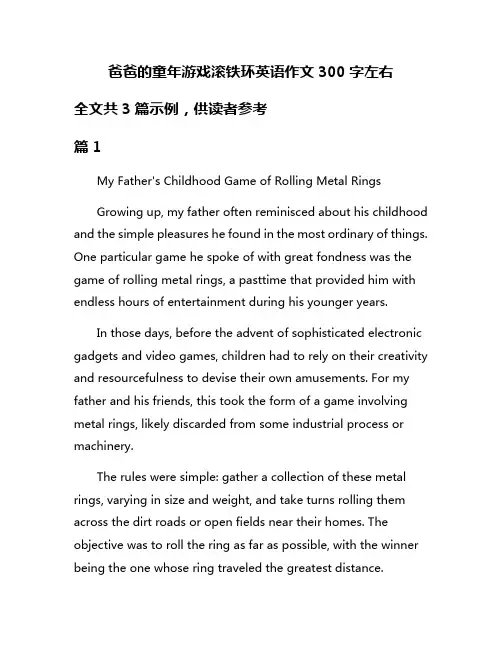
爸爸的童年游戏滚铁环英语作文300字左右全文共3篇示例,供读者参考篇1My Father's Childhood Game of Rolling Metal RingsGrowing up, my father often reminisced about his childhood and the simple pleasures he found in the most ordinary of things. One particular game he spoke of with great fondness was the game of rolling metal rings, a pasttime that provided him with endless hours of entertainment during his younger years.In those days, before the advent of sophisticated electronic gadgets and video games, children had to rely on their creativity and resourcefulness to devise their own amusements. For my father and his friends, this took the form of a game involving metal rings, likely discarded from some industrial process or machinery.The rules were simple: gather a collection of these metal rings, varying in size and weight, and take turns rolling them across the dirt roads or open fields near their homes. The objective was to roll the ring as far as possible, with the winner being the one whose ring traveled the greatest distance.What made this game so captivating, according to my father, was not only the competitive spirit it fostered but also the skill and technique required to execute the perfect roll. They would spend hours studying the terrain, looking for the smoothest patches of ground and adjusting their grip and stance to maximize the ring's momentum.Beyond the physical aspect of the game, my father spoke of the camaraderie and social bonds it fostered among his group of friends. As they gathered to play, they would exchange stories, jokes, and the latest neighborhood gossip, creating a sense of community and belonging that transcended the mere act of rolling metal rings.In retrospect, my father's fondness for this childhood game stemmed not only from the enjoyment it provided but also from the simplicity and innocence of those bygone days. It was a time when the most basic of objects could ignite the imagination and bring pure, unadulterated joy to a young heart.As I listened to these stories, I couldn't help but feel a twinge of envy for the carefree existence my father experienced as a child. In our modern world, where entertainment is packaged and delivered instantaneously, there is something profoundlybeautiful and nostalgic about the idea of finding such unbridled happiness in something as simple as rolling metal rings.篇2My Father's Childhood Game of Rolling Iron RingsWhen I was younger, I loved hearing stories from my dad about his childhood. One tale that always fascinated me was his description of a game he and his friends used to play called "Rolling Iron Rings." It was a simple yet challenging game that kept them entertained for hours on end.In those days, before the advent of modern technology and video games, children had to be more creative and resourceful when it came to finding ways to have fun. My dad's neighborhood was a humble one, with limited means, but that didn't stop him and his friends from turning everyday objects into sources of amusement.The game of Rolling Iron Rings involved taking old, discarded metal rings – sometimes from bicycle tires or machinery parts – and attempting to roll them as far as possible down the street using nothing but a straightened coat hanger. The rules were simple: each player took turns rolling their ring,and the one whose ring traveled the farthest distance was declared the winner of that round.According to my dad, mastering the art of rolling these iron rings was no easy feat. It required a delicate touch and precise control over the coat hanger's angle and force. Too much power, and the ring would veer off course or even bounce off the ground. Too little, and it wouldn't gain enough momentum to roll far.But the true appeal of the game, my dad would explain, wasn't just the challenge itself but the sense of camaraderie and friendly competition it fostered among the neighborhood kids. They would spend hours on the street, taking turns rolling their rings, cheering each other on, and reveling in the simple joys of childhood.As I listened to these stories, I couldn't help but feel a sense of nostalgia for a simpler time when entertainment wasn't dictated by screens and technology but rather by creativity, resourcefulness, and the ability to find joy in the most unexpected of places. It was a reminder that true happiness often lies in the simplest of things, and that the bonds of friendship forged through shared experiences can be just as precious as any material possession.篇3My Dad's Childhood Game of Rolling HoopsWhen I asked my dad what games he played as a kid growing up in a small village, he got a nostalgic look in his eyes and told me all about his favorite pastime - rolling hoops. It was such a simple game, but one that provided him with countless hours of fun and excitement.Back in those days, they didn't have fancy toys or video games. The kids had to make their own entertainment, using whatever resources were available to them. For my dad and his friends, that meant fashioning hoops out of strips of wood or metal scraps they could scavenge.The idea was to roll these hoops along the ground, chasing after them with a long stick, trying to keep them upright and going as far as possible before they inevitably clanged to the dirt road. My dad said it took skill and coordination to roll the hoop perfectly straight. Any little wobble and it would veer off course or topple over.They'd have contests to see who could roll their hoop the farthest distance without it falling. The village streets became their playing field, dodging vehicles (which were few back then),wandering chickens, and anything else that might disrupt their hoops' journey.Sometimes they'd decorate the hoops, painting them bright colors or adding bells that jingled as they rolled. It was a way to show creativity and individuality with their simple toys. More than just a game, it was an opportunity to socialize, build bonds, and create cherished memories.As I listened to my dad recount those bygone days, I could almost picture him as a carefree young boy, whiling away the hours rolling hoops with his pals, completely absorbed in their humble but wondrous game. It made me appreciate how kids can transform the most basic object into an imaginative adventure when motivated by youthful enthusiasm.While rolling hoops may seem terribly antiquated in our era of powerful gaming consoles, my dad's tales fill me with nostalgia for the simple joys and pleasures of childhood pastimes. Perhaps there's something we can learn from the ingenuity and creative spirit that defined playtime during those simpler times.。
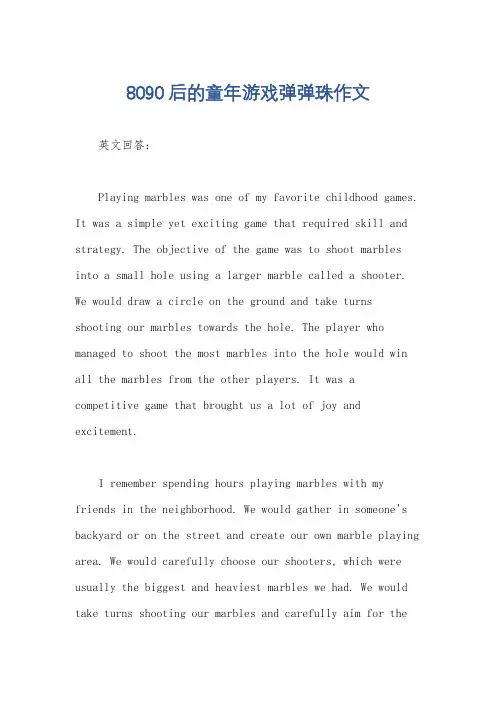
8090后的童年游戏弹弹珠作文英文回答:Playing marbles was one of my favorite childhood games. It was a simple yet exciting game that required skill and strategy. The objective of the game was to shoot marbles into a small hole using a larger marble called a shooter. We would draw a circle on the ground and take turns shooting our marbles towards the hole. The player who managed to shoot the most marbles into the hole would win all the marbles from the other players. It was a competitive game that brought us a lot of joy and excitement.I remember spending hours playing marbles with my friends in the neighborhood. We would gather in someone's backyard or on the street and create our own marble playing area. We would carefully choose our shooters, which were usually the biggest and heaviest marbles we had. We would take turns shooting our marbles and carefully aim for thehole. Sometimes we would use our fingers to flick the shooter, while other times we would use a small stick to give it more power and accuracy. It was always a challenge to shoot the marbles into the hole, but when we succeeded, it felt incredibly satisfying.Playing marbles was not just about shooting marblesinto a hole, it was also about trading and collecting marbles. We would bring our own marbles to the game and sometimes even bet them against each other. If we won a game, we would get to keep the marbles we won from the other players. This added an extra level of excitement and competitiveness to the game. We would often trade marbles with each other, trying to get the rarest and most valuable ones. It was like a mini marketplace where we would negotiate and barter for the marbles we desired.中文回答:弹弹珠是我童年时最喜欢的游戏之一。
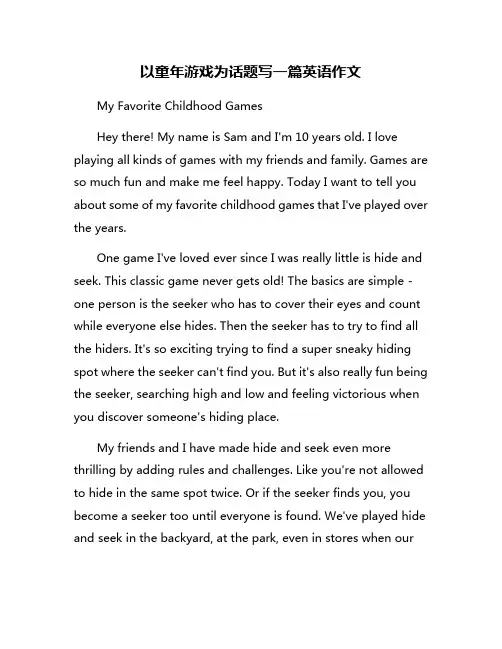
以童年游戏为话题写一篇英语作文My Favorite Childhood GamesHey there! My name is Sam and I'm 10 years old. I love playing all kinds of games with my friends and family. Games are so much fun and make me feel happy. Today I want to tell you about some of my favorite childhood games that I've played over the years.One game I've loved ever since I was really little is hide and seek. This classic game never gets old! The basics are simple - one person is the seeker who has to cover their eyes and count while everyone else hides. Then the seeker has to try to find all the hiders. It's so exciting trying to find a super sneaky hiding spot where the seeker can't find you. But it's also really fun being the seeker, searching high and low and feeling victorious when you discover someone's hiding place.My friends and I have made hide and seek even more thrilling by adding rules and challenges. Like you're not allowed to hide in the same spot twice. Or if the seeker finds you, you become a seeker too until everyone is found. We've played hide and seek in the backyard, at the park, even in stores when ourparents take us shopping. One time my buddy Thomas hid in the dryer and gave his mom quite a scare!Another game I go crazy for is tag. Running around tagging friends and trying not to get tagged yourself never fails to get my heart racing with excitement. The best part is the creative variations you can do, like freeze tag where you have to stay frozen until someone tags you and un-freezes you. Or sardines where instead of running from the person who's "it", you pack into their hiding spot one by one until everyone is crammed together like sardines in a can. My personal favorite is zombie tag where the person who is "it" has to moan and drag their foot as they chase people around trying to make them join the zombie horde.Four square is another super popular game at my school during recess. You use a bouncy ball to hit it into one of the four squares outlined on the pavement or playground. If you mess up, you're out and have to go to the end of the line waiting for a chance to get back into the game. It's simple but crazy competitive. I've seen kids get in arguments over whether a ball landed in or out of the lines. There's even a world of four square handshakes, rituals, and slang that you have to learn to really be part of the four square elite at my school.When it's cold outside, all the kids at school go bonkers over games you can play in the classroom or gym like heads up seven up. One person is the leader and walks around tapping heads while the other players put their heads down on their desks. If your head gets tapped, you put a thumb up. Then the leader has to guess who put their thumb up by calling out names. It's a fun memory game with an element of mystery and sleuthing.Board games are another realm of childhood games that I can't get enough of. Games like Candy Land, Chutes and Ladders, Connect Four, and Sorry are classics. I've spent many a weekend morning eating cereal and playing these games with my parents and my little sister Emily. I especially love games with fun little pieces to move around the board. Sometime the pieces are so adorable that I don't even care if I'm losing as long as I get to move them.A lot of kids seem to be really into video games these days. While I do enjoy gaming on screens sometimes, I've always been more of a fan of physical games you can play with friends in person. There's something about the energy and excitement of real human interaction that just can't be matched by even the most impressive graphics and mechanics.That said, I do have to shout out gaming networks like Roblox for sparking my interest in coding and game design. I've been learning simple programming languages so I can start creating and modding some of my own online games. I have a dream of one day designing really awesome gaming worlds and experiences for people to interact in. Games are just so cool because they allow you to inhabit a different reality, take on a new role and identity, and unleash your creativity.One of the best parts of games for me is the laughter, joy, and bonding they provide. When you're running around in a fever of tag or bouncing that four square ball back and forth, everything else fades away. You're just purely present in that moment of play and fun. And the satisfaction of pulling off a tricky move or winning a round is unmatched.Games also teach you all kinds of valuable life skills in an engaging way. They help you learn good sportsmanship, how to follow rules, problem-solving, teamwork, hand-eye coordination, strategy, and more. And because games are inherently fun, you don't even realize how much useful stuff you're absorbing.As I've gotten older, my love of games has evolved but remains strong. These days I'm really into games with more complex rules and strategies like chess, checkers, Monopoly, andRisk. I've started a chess club at school and my friends and I have famously intense tournaments of Risk that can go on for days or weeks.Soon I'll be moving on to middle school, but I know I'll hang on to my passion for gaming through those years and beyond. Games have created so many joyful memories from my childhood. They've helped me stay active, socialize with peers, strengthen my critical thinking abilities, and unleash my competitive spirit in a healthy way. While I'm sure my interests will continue expanding and changing, I don't think I'll ever outgrow my zest for a quality game night or an energetic round of tag. The magic of gaming is eternal!。
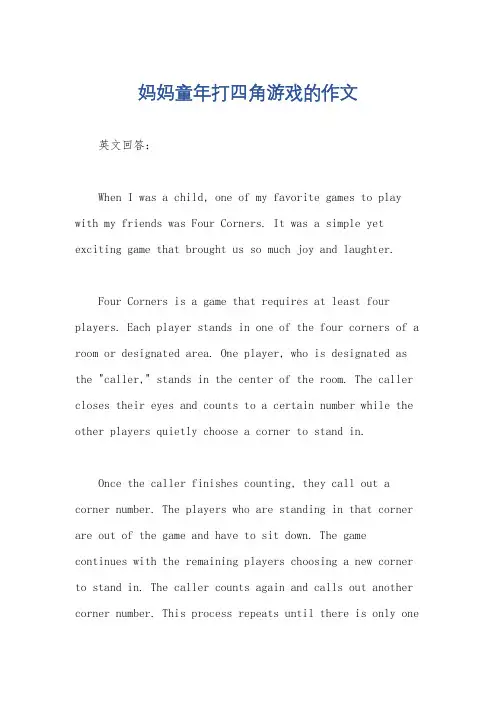
妈妈童年打四角游戏的作文英文回答:When I was a child, one of my favorite games to play with my friends was Four Corners. It was a simple yet exciting game that brought us so much joy and laughter.Four Corners is a game that requires at least four players. Each player stands in one of the four corners of a room or designated area. One player, who is designated as the "caller," stands in the center of the room. The caller closes their eyes and counts to a certain number while the other players quietly choose a corner to stand in.Once the caller finishes counting, they call out a corner number. The players who are standing in that corner are out of the game and have to sit down. The game continues with the remaining players choosing a new corner to stand in. The caller counts again and calls out another corner number. This process repeats until there is only oneplayer left standing, who is then declared the winner.I remember playing Four Corners during recess at school. We would gather in the playground and choose our corners, trying to strategize and predict which corner the caller would choose. It was always so much fun to see our friends get eliminated one by one, and the tension would build as the game progressed.Sometimes, we would use different tactics to outsmartthe caller. We would pretend to walk towards one corner,only to quickly change direction and run to another cornerat the last moment. It was a thrilling experience, and we would burst into laughter when someone successfully fooled the caller.中文回答:小时候,我最喜欢和朋友们一起玩的游戏之一就是四角游戏。
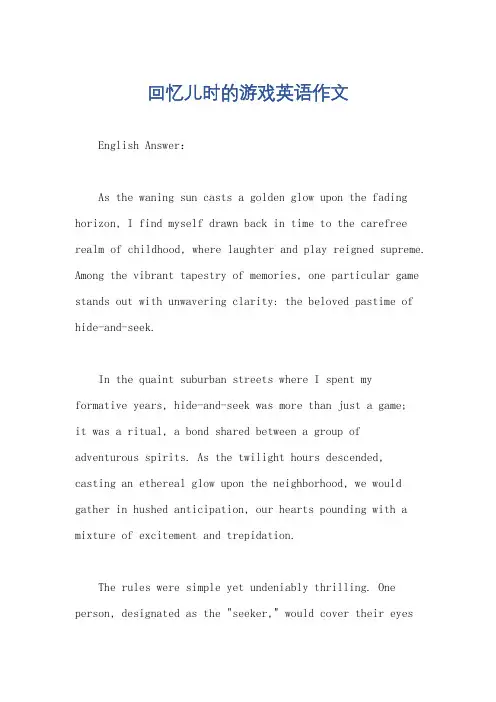
回忆儿时的游戏英语作文English Answer:As the waning sun casts a golden glow upon the fading horizon, I find myself drawn back in time to the carefree realm of childhood, where laughter and play reigned supreme. Among the vibrant tapestry of memories, one particular game stands out with unwavering clarity: the beloved pastime of hide-and-seek.In the quaint suburban streets where I spent my formative years, hide-and-seek was more than just a game;it was a ritual, a bond shared between a group of adventurous spirits. As the twilight hours descended,casting an ethereal glow upon the neighborhood, we would gather in hushed anticipation, our hearts pounding with a mixture of excitement and trepidation.The rules were simple yet undeniably thrilling. One person, designated as the "seeker," would cover their eyesand count to an agreed-upon number, giving the rest of us ample time to scatter and find our hiding spots. As the seeker's voice reached the final count, a deafening chorus of "Ready or not, here I come!" would echo through the air, signaling the start of the chase.With the seeker hot on our trail, we would dart through bushes, scale fences, and squeeze into the most ingenious hiding places we could find. The thrill of the chase was intoxicating, the adrenaline coursing through our veins as we held our breath, hoping to remain undiscovered.The seeker would tirelessly search every nook and cranny, their keen eyes scanning for any sign of our presence. We would watch with bated breath as they approached our hiding spots, our hearts pounding like drums in our chests. The moment of discovery was bothexhilarating and triumphant, as the seeker would triumphantly announce our capture.One particular game stands out in my memory as a testament to the enduring power of childhood imagination.We had decided to play hide-and-seek in the vast expanse of our backyard, a sprawling wonderland of towering trees,lush bushes, and a shimmering pond. I had chosen to hide in a secluded corner behind a towering oak tree.As the seeker approached my hiding spot, I held my breath, my heart threatening to leap out of my chest. With agonizing slowness, they drew closer and closer, their footsteps crunching on the gravel path. Just as I thought I was about to be discovered, a sudden gust of wind blew through the branches, creating a rustling sound that distracted the seeker. I held my breath, my body trembling with relief.For what seemed like an eternity, I remained motionless, my eyes fixed on the seeker's every move. Finally, theygave up the search and moved on, leaving me to savor the thrill of my close escape. As the game continued, I reveled in the camaraderie and laughter shared with my friends. We chased each other through the backyard, our voices echoing through the fading light.As the stars began to twinkle above, it was time forthe game to end. We gathered once more, our faces flushed and our spirits filled with the joy of childhood. The bonds we had forged through our shared adventures would last a lifetime.Looking back on those carefree days, I am filled with a profound sense of gratitude for the simple yet profound joy that childhood games brought into my life. Hide-and-seek taught me the value of imagination, perseverance, and the enduring power of friendship. As an adult, I may havetraded in the physical chase for more cerebral pursuits,but the lessons I learned during those childhood games continue to guide me through life's challenges.Chinese Answer:随着夕阳西下,金色的余晖洒在逐渐暗淡的地平线上,我发现自己被拉回了无忧无虑的童年时光,在那里,欢笑和玩耍至高无上。
爸妈小时候玩的游戏用英语作文形式写Title: Games Parents Played When They Were KidsWhen it comes to childhood memories, one of the most cherished aspects is the games children play. Growing up in a different time period, our parents had their own set of games that they loved to play with their siblings and friends. These games were simple yet brought so much joy and laughter. Let's take a trip down memory lane and explore some of the games our parents played when they were kids.1. Hide and Seek: A classic game that never goes out of style, hide and seek was a favorite among children of all ages. Parents recall spending hours trying to find the perfect hiding spot, only to burst into giggles when they were discovered by their friends. The thrill of hiding and the excitement of seeking made this game a timeless favorite.2. Hopscotch: This game required chalk, a flat surface, and a rock or small object to toss. Parents would draw the hopscotch grid on the ground and take turns hopping through the squares while trying to avoid stepping on the lines. It was a game of skill, balance, and coordination that provided hours of entertainment.3. Red Rover: A game of strength and teamwork, Red Rover involved two teams holding hands in a line while calling out, "Red Rover, Red Rover, send [name] right over!" The designated player would then run towards the opposing team and try to break through their linked arms. It was a competitive game that taught children the importance of working together.4. Kick the Can: A game that combined strategy and agility, Kick the Can was a favorite outdoor activity. Parents would place a can in the middle of a designated area and try to kick it while avoiding being tagged by the person who was "It." The goal was to kick the can before being caught, adding an element of speed and excitement to the game.5. Tag: A simple yet thrilling game, tag involved one player chasing after and trying to tag another player. Once tagged, the player would become "It" and the game would continue. Parents fondly remember the rush of adrenaline as they sprinted around the yard, trying to avoid being caught and tagged.6. Simon Says: A game of listening and following instructions, Simon Says was a fun and engaging activity for children. Parents would take turns being "Simon" and giving commands such as, "Simon says touch your toes" or "Simon says hop on one foot." The challenge was to only follow the commands that began with"Simon says" and not the others, leading to laughter and surprises.7. Jump Rope: A classic game that required coordination and rhythm, jump rope was a favorite pastime for parents. They would take turns holding the rope for each other while jumping in sync to the rhythm. Whether it was a simple two-person jump or a more complex group routine, jump rope was a great way to stay active and have fun.In conclusion, the games our parents played when they were kids may have been simple, but they held a special place in their hearts. These games fostered creativity, teamwork, and physical activity, providing hours of entertainment and bonding with siblings and friends. As we look back on these childhood memories, we can appreciate the joy and laughter that these games brought to our parents and the lasting impact they had on their lives.。
过去小朋友玩的游戏英语作文English: In the past, children used to play a wide variety of games that were simple yet incredibly fun. One popular game was hopscotch, where kids would draw a grid on the ground and hop from square to square while trying to avoid stepping on the lines. Another common game was tag, where one player would be "it" and try to tag other players, who would then become "it" themselves. Hide and seek was also a favorite, with one player closing their eyes and counting while the other players found a place to hide. Other games like jump rope, marbles, and red light green light were also cherished by children all around the world. These games required little to no equipment and allowed children to use their imagination and creativity to have endless hours of fun.中文翻译: 过去,小朋友们玩的游戏种类繁多,简单却异常有趣。
父母小时候的游戏扔沙包作文英文回答:The childhood game of beanbags is a classic and beloved pastime that has been enjoyed by generations of children. The game is simple to play and requires minimal equipment, making it a great option for both indoor and outdoor play.To play beanbags, you will need a beanbag and a target. The target can be anything from a tree or a wall to a designated spot on the ground. The object of the game is to throw the beanbag as close to the target as possible.There are many different ways to play beanbags. One common variation is to have players take turns throwing the beanbag at the target. The player who gets the beanbag closest to the target wins a point. Another variation is to have players throw the beanbag at a series of targets, with each target being worth a different number of points. The player with the most points at the end of the game wins.Beanbags is a great game for children of all ages. Itis a fun and active way to get exercise, and it can also help children develop their hand-eye coordination andspatial awareness.中文回答:小时候父母常玩的游戏——扔沙包。
1.游戏用英语怎么写游戏英文:game,play,sport,recreation.这四个单词都有游戏的意思,根据不同的语境用不同的单词。
game一词最普遍的译意为“游戏”,意为游乐嬉戏;玩耍。
在英语中game一词另外一个重要意义为“竞赛”、“运动会”,如:football game(足球比赛)、the Olympic Games(奥林匹克运动会)基本要点:⒈game用作名词的意思是“游戏,运动,比赛”,也可表示比赛中的“一局、一盘或一场,比分,比赛规则”。
引申可表示“策略,诡计”,是可数名词。
⒉game也可指游戏或运动的“器材”,是可数名词。
⒊game也可表示“行业,行当”,是可数名词,属非正式用法。
⒋game还可表示“猎物”,不可数,此时前面不可加不定冠词a。
⒌game的复数形式games的意思是“运动会,竞技赛”,与定冠词the连用,在特指某届〔次〕运动会时其谓语动词用单数形式,统指(多届的)运动会时其谓语动词用复数形式,作专有名称时首字母常大写。
2.游戏用英语怎么写游戏的英文:Game Game 读法英 [ɡeɪm] 美 [ɡeɪm] n. 游戏;运动会;比赛;一场比赛;比赛得分;猎物;花招 v. 赌博 adj. 勇敢的;乐意的;跛的例句 1、The game starts at seven o'clock.比赛7点钟就开始。
引申可表示“策略,诡计”,是可数名词。
2、game也可表示“行业,行当”,是可数名词,属非正式用法。
3、game作“勇敢的,有决心的,敢作敢为的”解时在句中可用作定语或表语。
4、game也可作“愿意的,心甘情愿的”解,在句中多用作表语,与介词for连用。
5、在口语中, game还可作“残疾的;瘸的”解,属古旧用法。
词汇搭配 1、international game 国际比赛 2、losing game 不可能取胜的比赛 3、open game 胜负未定的比赛 4、outdoor game 户外运动会,室外游戏 5、popular game 普及的运动项目。
1.游戏用英语怎么写游戏英文:game,play,sport,recreation.这四个单词都有游戏的意思,根据不同的语境用不同的单词。
game一词最普遍的译意为“游戏”,意为游乐嬉戏;玩耍。
在英语中game一词另外一个重要意义为“竞赛”、“运动会”,如:football game(足球比赛)、the Olympic Games(奥林匹克运动会)基本要点:⒈game用作名词的意思是“游戏,运动,比赛”,也可表示比赛中的“一局、一盘或一场,比分,比赛规则”。
引申可表示“策略,诡计”,是可数名词。
⒉game也可指游戏或运动的“器材”,是可数名词。
⒊game也可表示“行业,行当”,是可数名词,属非正式用法。
⒋game还可表示“猎物”,不可数,此时前面不可加不定冠词a。
⒌game的复数形式games的意思是“运动会,竞技赛”,与定冠词the连用,在特指某届〔次〕运动会时其谓语动词用单数形式,统指(多届的)运动会时其谓语动词用复数形式,作专有名称时首字母常大写。
2.一起玩游戏的英文如何写1.Simon says老师站在学生前,她每做一个动作前都会说声"Simon says,Thumps up.""Simon says, touch your head", "Simon says, point up." etc.,学生听到这些Simon的指令要跟着做这些动作.如果老师不说Simon says,只是说"Thumps up.而学声把拇指竖起,那么这个学生就出局了.谁能坚持到最后,谁就赢了这个游戏.这个游戏很受小朋友喜欢.对学身体各部位的单词,或是做些简单动作有很大帮助.老师可加各种各样的句子.Simon say, "Touch your ears."Simon says, walk slowly" stop walking!"Simon says, fly a kite."用身体语言学英文对小朋友是很有效的.3.玩的英文怎样写play目录释义权威词典例句百科网友贡献英文写作助手go top想要图(8)玩[wán]vi. play在例句中比较网络释义汉语词典 Play打德州扑克倒没怎样输,严重输在玩(Play)21点上了。